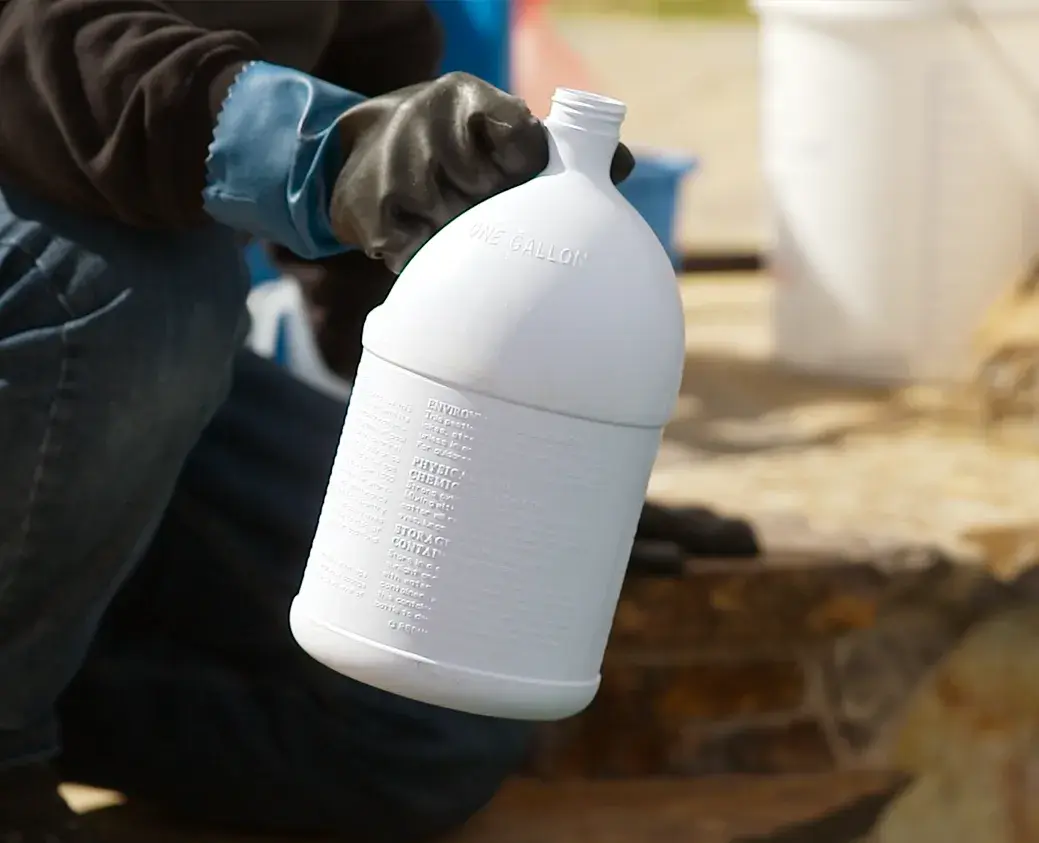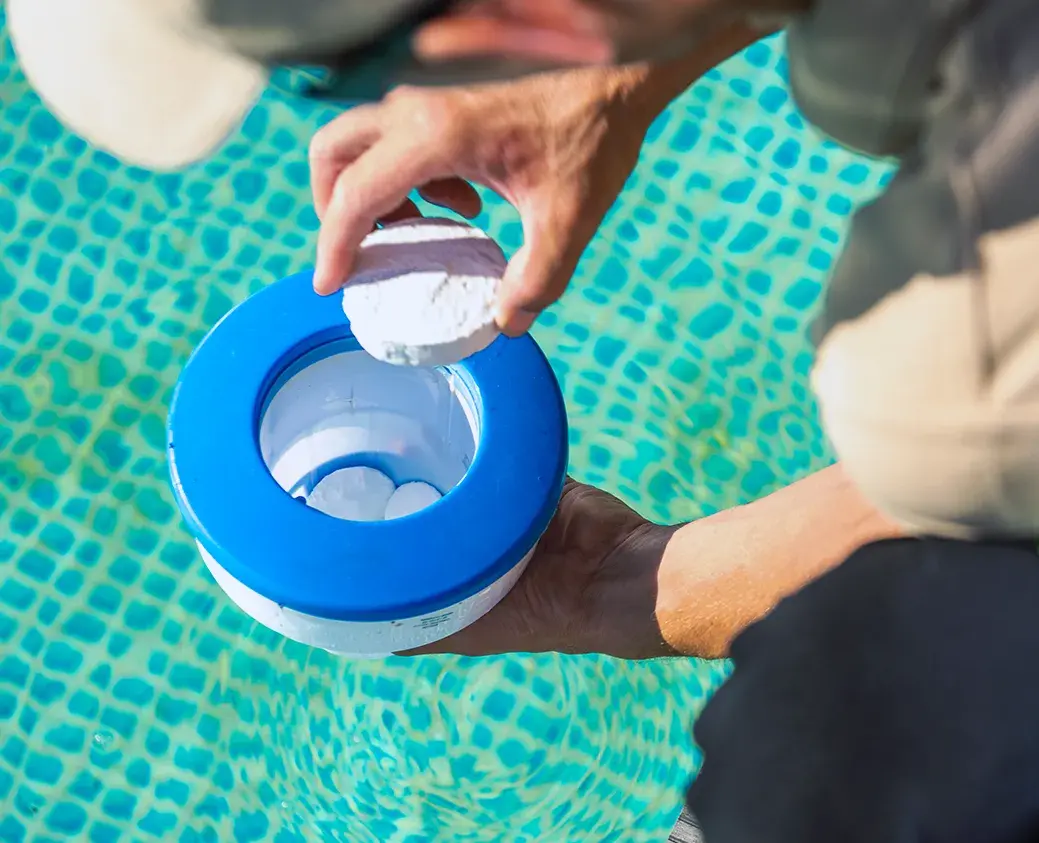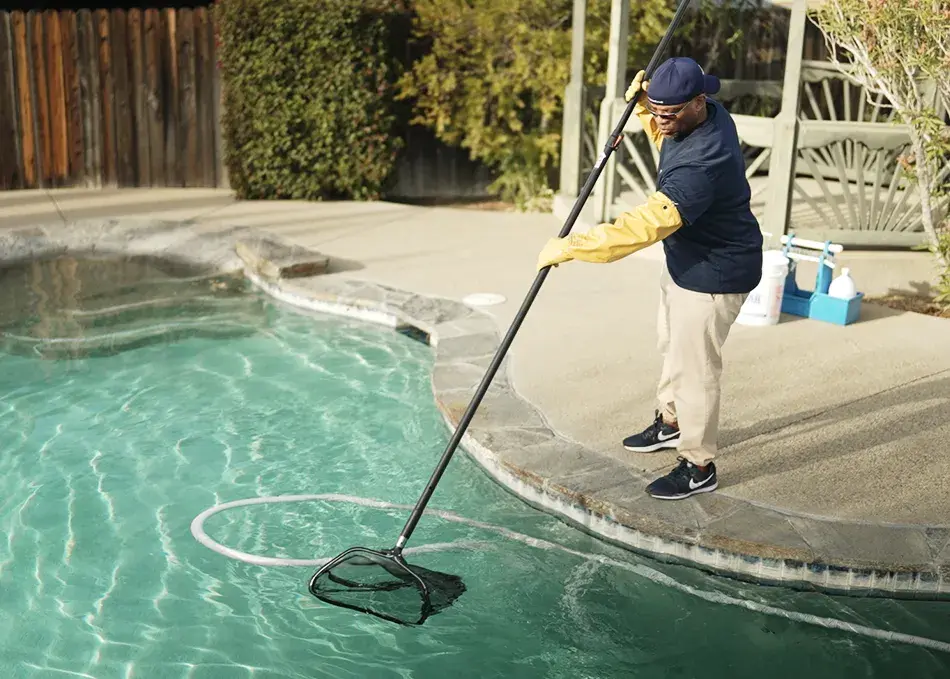Liquid Chlorine vs. Tablets - A Guide for Pool Pros
Maintaining optimal water quality is the heart of professional pool service. The discussion about chlorine tablets versus liquid delivery is growing....
⬢ Pool Professionals
Professional-grade products. Expert support. Built for your business.
⬢ Pool Owners
Eco-friendly, easy-to-use solutions to keep your pool clean and clear.
⬢ Industrial
Efficient treatment & supply. Performance-focused operations support.
⬢ Municipal
Reliable solutions & delivery. Sustainable treatment for public systems.
⬢ Dealers
Help your pool & spa customers with trusted, professional-grade products.
⬢ Pool Products
HASA has the chlorine, algaecides, and sanitizers you need to keep your pool or spa clean and clear.
⬢ Hot Tub Products
Shop our full line of Hi-Temp spa care products, including Eco-Safe Clarifiers and pH Increasers.
⬢ Ancillary Products
Our eco-friendly water treatments are science-backed and purposefully focused.
⬢ Mini-Bulk Program
We deliver a premium 12.5% sodium hypochlorite solution for sanitizing commercial pools and large-scale water systems.
⬢ Blog
Learn from water chemistry experts.
⬢ Videos
Browse instructional how-to videos.
⬢ Safety Data Sheets
Download SDS sheets for HASA products.
⬢ Pool Chemical Calculator
Achieve balanced chemistry easily.
⬢ Liquid Chlorine For Pools
A service professional’s guide that's been made simple.
⬢ Orenda Academy
For water chemistry & professional pool management knowledge.
⬢ Events
Find HASA at an event near you.
⬢ Rewards
Explore our HASA loyalty rewards program.
⬢ About HASA
Learn about HASA's commitment via the returnable packaging model.
⬢ Careers
Explore open positions with HASA.

Choosing the right pool sanitizer isn’t just a matter of preference; it’s the backbone of safe, efficient, and reliable water treatment. For pool care professionals, every decision impacts not only swimmer safety but also long-term maintenance, environmental impact,and the quality of the water.. And yet, myths and misinformation about common pool chemicals can lead even experienced professionals to make chemistry decisions that compromise water quality, operational efficiency, or sustainability.
Liquid chlorine for pools remains a time-tested, highly effective, and versatile sanitizer. Unfortunately, persistent myths diminish its value, deterring professionals from leveraging its benefits in favor of less optimal options. This article dispels five of the most common myths about liquid pool chlorine and demonstrates why industry leaders rely on it as both a daily sanitizer and shock treatment.
Discover why liquid chlorine is still one of the safest, easiest, and most sustainable ways to achieve pool water that’s reliably safe, clean, and clear. We’ll also highlight how HASA’s liquid pool chlorine stands apart as an eco-conscious, high-performance choice for water professionals who expect the best.
Despite decades of safe, effective use, liquid chlorine is still subject to widespread misconceptions. A closer look at the data and real-world results prove that more pool professionals are choosing liquid as a preferred sanitizer and shock.
A frequent misconception is that liquid chlorine is less powerful or works less efficiently than solid alternatives such as tablets or powdered shock treatments. This myth is easily dispelled by examining the chemistry and performance in the field.
Liquid chlorine for pool applications is primarily composed of sodium hypochlorite, offering rapid and direct delivery of free available chlorine (FAC) to pool water. When freshly produced and properly dosed, its disinfecting capability equals or surpasses other forms of chlorine. Unlike solid forms of chlorine, liquid chlorine introduces more pure chlorine without added byproducts such as calcium or cyanuric acid(CYA). This reduces problems associated with the build-up of unwanted byproducts, and allows for more consistent, accurate dosing.
In crisis situations and routine operations alike, liquid sodium hypochlorite has been shown to deliver measurable, reliable free chlorine residuals, ensuring effective sanitation and oxidation of contaminants (read more). Ultimately, the rapid solubility, predictability, and multi-use advantages of liquid chlorine are what makes it the sanitizer of choice for forward-thinking professionals.
Some believe that liquid pool chlorine introduces instability, making water chemistry difficult to balance. Primarily, it is assumed that liquid chlorine raises the pH of the pool water leading to an increased use of acid. This is a misunderstanding of the reaction of liquid chlorine in water. Liquid chlorine in containment has a higher pH, which is to ensure the preservation of the product in the bottle. Once liquid chlorine is added to pool water immediate reactions take place that cause the pH of the liquid to equalize closer to the pH of the pool water. In operational outdoor pools at normal temperatures liquid chlorine will not raise the pH.Liquid chlorine is, in fact, one of the most sustainable sanitizers when used correctly. This is unlike trichlor tablets, which contain l cyanuric acid (CYA) and lower both the pH and total alkalinity.Liquid chlorine provides a straightforward dose of active chlorine with minimal side effects. Trichlor tablets also can raise CYA to levels that reduce effective chlorine disinfection. Liquid chlorine's formulation avoids the risk from decreased disinfection of pool water.
Myth #3 - Liquid Chlorine Is Unsafe for Handling and Storage
Another myth is that liquid chlorine for swimming pools is inherently more dangerous to handle or store compared to other sanitizers. Yet, with proper procedures, liquid chlorine is one of the safest options available to pool technicians.
Professional guidelines, including those from U.S. Chemical Storage and the CDC, recommend standard PPE (personal protective equipment) such as gloves and goggles, and safe storage practices applicable to all strong oxidizers. Liquid chlorine is nonflammable, noncombustible, and presents no risk of explosive reactions when kept separate from incompatible substances.
Storing liquid pool chlorine in original, well-sealed containers within cool, ventilated, and dedicated areas is straightforward and compliant with modern safety standards. When handled responsibly, liquid pool chlorine offers controlled, reliable sanitation without exceptional hazards.
While liquid chlorine which is sodium hypochlorite contains sodium chloride. It is proven that compared to cyanuric acid CYA and calcium, the sodium chloride from liquid is the least detrimental. In fact the sodium chloride from liquid chlorine as a part of TDS will not lead to cloudy water, scale or reduced disinfection. It is the build up of other by products such as calcium and CYA that lead to cloudy water, scale and lack of sufficient disinfection.
Cost-effectiveness is critical for every pool professional. An enduring myth is that chlorinated liquid for pools is less economical over time. This claim fails under scrutiny.
While upfront cost per gallon may sometimes appear higher than for bulk dry tablets or powders, liquid chlorine provides the highest level of pure chlorine per dose and avoids secondary costs associated with excess calcium, CYA buildup, or other byproduct-related issues. These problems often require expensive water replacement, added chemicals, or extra labor.
Long-term, studies show that liquid chlorine reduces operational costs by:
When factoring reliability, minimized downtime, and environmental compliance, liquid chlorine emerges as the truly cost-efficient choice.
For professionals invested in operational excellence and customer safety, liquid swimming pool chlorine offers distinct technical and sustainability advantages:
Versatility
Liquid chlorine integrates seamlessly with most pool systems, from commercial facilities to residential pools. It can be dispensed manually, by automated chemical feeders, or using advanced liquid chlorinators. Its rapid solubility ensures immediate availability of sanitizer and shock performance in both residential and commercial pools.
Accuracy
Precise dosing is essential for regulatory compliance and optimal water clarity. Liquid chlorine allows for fine-tuned control, delivering exact concentrations needed for specific volumes, bather loads, or local water conditions. This accuracy minimizes overuse and waste, supporting both cost savings and water quality. Add Liquid Chlorine Dosing Chart
Eco-Friendly Advantage
Sustainability is not optional for modern pool businesses. Leading producers like HASA are committed to ongoing waste reduction and resource conservation. In many parts of the country HASA’s reusable, recyclable containers drastically lower single-use plastic waste. Efficient product delivery and refill programs reinforce an eco-friendly supply chain, helping service companies meet environmental regulations and public expectations.
Reduced Chemical Footprint
With no added calcium or (CYA) stabilizer, maintaining balanced water is simpler, requiring fewer corrective treatments and saving significant labor hours over the pool season.
Professional Support and Reliability
Manufacturers like HASA back their products with technical support, documented best practices, and dependable supply chains. Fast delivery, technical guidance, and predictable product performance help ensure pool professionals can meet service demands year-round.
Not all liquid swimming pool chlorine products are created equal. HASA distinguishes itself with an unwavering focus on quality, technology, and sustainability.
Industry-Leading Quality
For more than five decades, HASA has set the benchmark for liquid chlorine for pools, maintaining stringent quality control and leveraging state-of-the-art technology. Every batch is produced to meet the highest performance standards, ensuring a reliable supply of potent, fast-acting chlorine.
Sustainability and Eco-Conscious Practices
HASA’s commitment to sustainability is evidenced in its returnable, recyclable bottles. This initiative keeps significant volumes of plastic out of landfills and demonstrates corporate responsibility in reducing environmental impact. Professionally managed retrieval and refill operations reinforce the company’s dedication to both quality and community.
Freshness and Consistency
HASA delivers its products fresh and on schedule, maximizing the efficacy of each container. Product freshness is essential for maintaining the highest available chlorine content and ensuring that water treatment outcomes remain consistent across all job sites. HASA production facilities produce and bottle sodium hypochlorite at the same facility, using advanced filtration. This removes metals and sediment that can accelerate chlorine breakdown and cause wear on pool equipment over time.
The result? Stronger product, longer shelf life, and better protection for your investment. HASA’s Pro Grade sodium hypochlorite is made fresh, filtered clean, and continuously delivered to ensure performance.
Technical Expertise
Technicians and water treatment specialists appreciate HASA’s wealth of educational resources, safety data sheets, and ongoing professional development. HASA stands as a partner in compliance, safety, and operational training, enabling professionals to reduce risk and deliver superior results.
Liquid chlorine is a pure sodium hypochlorite solution that rapidly provides active chlorine. Tablets dissolve slowly and typically contain stabilizers ( CYA) or calcium byproducts, introducing additional unwanted chemicals into the water.
When stored under ideal conditions (cool, dry, out of direct sunlight), most liquid chlorine maintains potency for several months. How do I store liquid chlorine safely?
Store in original, sealed containers in a dedicated location away from acids and incompatible chemicals. Ensure the area is well-ventilated and protected from unauthorized access. Follow PPE and handling guidelines as outlined by the CDC. For best practices, store liquid chlorine in secondary containment.
Dosage depends on pool volume, current chlorine demand, and target free chlorine levels. Consult supplier guidelines and best practices.
Risks are minimized with proper handling, storage, and adherence to established protocols. Always follow PPE guidelines and avoid mixing with incompatible substances.
Yes. Liquid chlorine serves as an excellent supplemental sanitizer or shock in saltwater pools, especially when chlorine generators are inactive or sanitizer demand is high.
The only notable limitations are the need for proper storage (avoiding high heat/sunlight) and the requirement to periodically monitor pH and total alkalinity levels, which is routine in any pool maintenance program.
For routine sanitation, liquid chlorine is highly effective. Shock products and treatments are often reserved for specific needs (e.g., superchlorination) but are not a replacement for ongoing sanitation. Learn more: HASA's Blog on Shock
HASA’s Pro Grade liquid chlorine (sodium hypochlorite) is often called bleach, but it’s far from the stuff under your kitchen sink. Both are sodium hypochlorite, but pool liquid chlorine is a higher-strength solution formulated for pools and should be used accordingly. Bleach from supermarkets can also contain softeners, fillers and fragrances. Only high strength liquid pool chlorine should be used for swimming pools.
It is used for the primary sanitation and shock oxidation of pool water, ensuring safety, clarity and compliance with water quality standards.
Liquid chlorine stands out as one of the better choices for pool care professionals striving for excellence. The persistent myths addressed heredo not hold up to scrutiny.
HASA’s liquid pool chlorine is distinguished by its superior quality, freshness, and eco-conscious packaging, providing peace of mind for every pool professional. When you select HASA, you invest in safety, sustainability, and reliability. Take action now to ensure your business delivers safe, clean and clear, compliant pool water every time with liquid pool chlorine from HASA.

Maintaining optimal water quality is the heart of professional pool service. The discussion about chlorine tablets versus liquid delivery is growing....

HASA’s resident pool water treatment expert, Terry Arko, recently joined the Pool Guy Podcast Show to discuss why HASA’s Liquid Chlorine...

Owning a pool should be about relaxation, not constant weekend upkeep. With the right strategies, efficient routines, and high-quality products, easy...